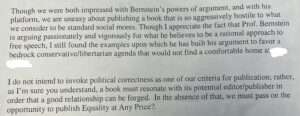Twenty years ago, the Cato Institute published my book, You Can't Say That!: The Growing Threat to Civil Liberties from Antidiscrimination Laws. The basic theme of the book was that as the scope of antidiscrimination laws has expanded, these laws increasingly infringe on bedrock constitutional liberties, especially freedom of expression. To the extent that there is a conflict, the rights protected by the Constitution should win out over claims that the infringements are justified by an asserted compelling government interest in "eradicating" discrimination.
Cato tried very hard to place the book with a publisher, but constantly ran into ideological opposition. I couldn't help but think how ironic it was that book editors, of all people, thought a book was too favorable to freedom of expression. Indeed, one publisher even suggested that the book's relatively tame libertarian theme was "aggressively hostile … to standard social mores." (see excerpt below, from when the book had a different working title).
This past term, in the 303 Creative case, the Supreme Court explicitly rejected the notion that freedom of speech can be infringed by the government in the name of the government's asserting compelling interest in ensuring "equal access to publicly available goods and services." While I can't take personal credit for this holding, I'm pleased to say that the position I took twenty years ago, which struck book editors as so radical as to be "aggressively hostile … to standard social mores," is now the law of the land.

The post 20 Years After You Can't Say That! Was Published, Feeling Vindicated by 303 Creative appeared first on Reason.com.







